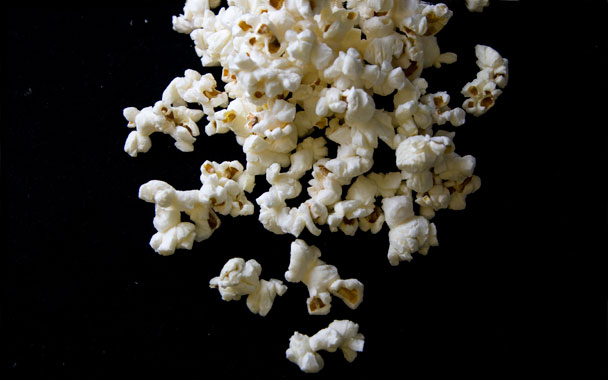Popcorn has always played more of a symbolic role in my life than a dietary one. On family movie nights, it sat warm in a big white melamine bowl on the coffee table as my dad fiddled with the VHS player; later, during my internship at an alternative newsweekly, popcorn was a late-night dinner staple for an editor I admired, becoming linked in my mind with all that is true and good about journalism. I like to watch people eat it at the movies, pondering the Pavlovian compulsion that it inspires in loved ones—even if it’s stale and awful and covered in fake butter, even if we’ve just had a filling meal. There’s something very American about all of these associations—the cinephilic childhood, the hard work, the mindless snacking. But I hardly ever eat popcorn myself, at the movies or otherwise: Philosophically I’m not the biggest fan of processed corn products; and as appealing as good, salty, buttery kernels can be, there just always seems to be something else I’d rather eat instead. (Caramel corn and popcorn with nuts are another story.)
Two things happened last week to make me question my outlook. The first was that I got an email from Nick Thompson, a Wired editor who does gadget testing for the Today Show. He was preparing to do a segment about popcorn makers and needed to test a bunch of different options beforehand—but Wired, a magazine devoted mainly to non-culinary technology, doesn’t have stoves in its offices, so he asked if he could come to the Gourmet test kitchen a few floors down and borrow one of our stovetops. We were happy to oblige, and I was curious to see if the experience would add a spark to my cordially distant relationship with the snack. Could the right corn from the right popper turn me into one of those “average Americans” who eats 70 quarts of popcorn a year?
I hung around the kitchen and helped out as Thompson and his colleague Daniel Roth tested four poppers: an old-fashioned, hand-cranked Whirley-Pop; a Cuisinart electric popper with a plastic dome top that turns into a handy serving bowl; a classic, cheap little air-popper; and a ceramic model that you stick in the microwave. The three of us agreed that the Cuisinart blew the others out of the water, including the Whirley-Pop, which had received high marks in other publications. The Cuisinart produced kernels that were light and fluffy, with the perfect crunch and a slightly caramelized, roasted corn flavor; with a little butter and salt they were hopelessly addictive. The Whirley-Pop’s kernels were perfectly round but sort of hard and pockmarked, as though they’d been exposed to very intense heat. (And indeed, that’s what had happened: The Whirley-Pop was designed to be churned constantly while the kernels heat, not to be intermittently tended and forgotten while people flit from popper to popper; when properly managed during rehearsals on the set, Thompson told me later, the Whirley came out ahead.)
The Wired guys left us with a big bag of the Cuisinart-popped corn as a thank-you gift. A few hours later I was back at my desk, working late, crunching the delicious kernels a bit mindlessly and feeling connected by a long popcorn chain across the country to my former editor.
The next day, a second thing happened: I read an article about British movie theatres banning popcorn. As the BBC’s Stephen Robb reports, the UK’s largest art-house chain, Picturehouse Cinemas, is doing a trial of “popcorn-free screenings” at one of its theatres, following the lead of other British chains. “Popcorn is a contentious issue,” a Picturehouse rep told Robb. “Lots of people absolutely hate it and have asked us to ban it.” Why hate popcorn? “Noisy, messy and downmarket, seems to be the accusation being made within the cinema industry,” Robb writes. Downmarket? As the artistic director of another London indie theatre puts it, popcorn is “a form of junk food... that encourages junk entertainment.”




 Pinterest
Pinterest


